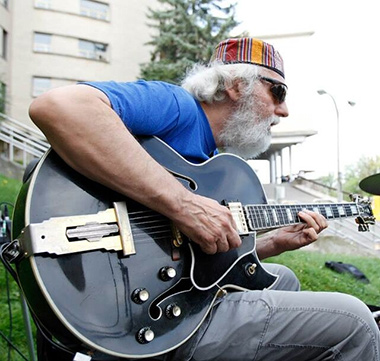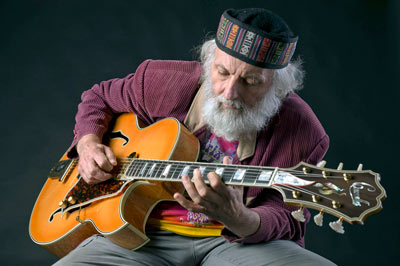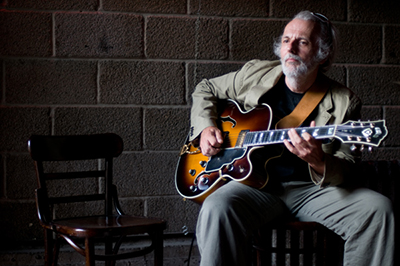 Michael Gauthier is a Montreal-based jazz guitarist and teacher. His guitar sound is characterised by a warm, earthy blues inspired music and the technical skill of a jazz master. A native of Drummondville and a long-time pillar of the Montreal jazz scene, he’s played with and learned from many jazz greats, including Archie Shepp, Bill Hardman, J.R Monterose, Big John Patton, Fraser McPherson, Clifford Jordan, Charles Davis, Ray Drummond, Curtis Fuller, and Oliver Jones. Recently he took the time to answer Wanda Waterman’s questions about the care and feeding of budding jazz talents. You can read more in the first, second, and third parts of this interview. His music can be sampled and purchased here.
Michael Gauthier is a Montreal-based jazz guitarist and teacher. His guitar sound is characterised by a warm, earthy blues inspired music and the technical skill of a jazz master. A native of Drummondville and a long-time pillar of the Montreal jazz scene, he’s played with and learned from many jazz greats, including Archie Shepp, Bill Hardman, J.R Monterose, Big John Patton, Fraser McPherson, Clifford Jordan, Charles Davis, Ray Drummond, Curtis Fuller, and Oliver Jones. Recently he took the time to answer Wanda Waterman’s questions about the care and feeding of budding jazz talents. You can read more in the first, second, and third parts of this interview. His music can be sampled and purchased here.
“My music is a reflection of exactly what I’m feeling about life, and That’s what I want my guitar playing to be. I want it to represent what I love.”
-Michael Gauthier
Jazz can’t Be Taught, Only Learned
Wayne Shorter, the great saxophone player, said this, “Jazz can be learned, but it cannot be taught.” So I tell my students that I can’t teach them but I can help them learn.
Jazz students don’t have to plan what they want their music to be in twenty years, because they’re apt to change their minds in the interim, but in the short term they should be strengthening their weaknesses, honing their strengths, and deciding what they want to sound like.
Students should be able to wake up in the morning and know exactly what they want to do, not what the teacher wants them to do. Waking up and feeling this way in the mornings is what has developed me more than anything else; I know where I want to go.
Consistently Changing
I’ve told my students that they’re allowed to change their minds. Coltrane was a genius, and he changed his mind. He had a very short, twelve-year, maybe, recording career. His music style changed four times in those twelve years, and drastically.
I tell my students that the faster I succeed in getting them to the point where they don’t need me anymore, the better I’ve done. I realize I’m kind of shooting myself in the foot in saying that, as I seem to be telling them, “I want to get rid of you,” but the more quickly they become autonomous, the faster they evolve as artists.
In order to be autonomous, though, you must have a vision of who you are, or who you want to be.
My music is a reflection of exactly what I’m feeling about life, and That’s what I want my guitar playing to be. I want it to represent what I love.
Sound and Emotion
With my students I emphasize two things: sound and emotion. Sound, that is the physical sound of the instrument, is the sound that the student wants to be known for. This doesn’t have to have anything to do with music yet?It’s just a signature sound from them That’s different from the sound any old guitar can make. Whether or not a person is a trained musician, the first thing they listen for when hearing somebody else play music is not the musical ideas, but rather the sound of the instrument. They’ll notice whether or not the sound grabs them.
The next thing that I mention to my students is the emotion. Even with Les Paul, who historically was a great musician, you must ask, “Where’s the emotion?” Unfortunately, a lot of jazz is very aesthetic and intellectual. It’s a bunch of notes that may be brilliant or intriguing, but I want to hear love, sadness, nostalgia?a sense of loss. I want to hear love lost and broken hearts. I want to hear about happiness. I can’t teach students how to do all of that for them; I can only know how to do it for me.
I see blues as being a perfect vehicle for that. Blues is about expressing emotion, and it is very rare for you to hear blues that is devoid of it; emotion is part of the deal.
This may sound like a stupid statement, but I try to make my guitar not sound like a guitar, and I teach others the same thing. I want it to sound like a singer, like the human voice. The most expressive instrument of all is the human voice; It’s instrument the most directly connected to your soul.
The Ultimate Pat on the Back
To me, the biggest compliment I can get is not a pat on the back from another musician but rather one from somebody who knows little to nothing about music. When I just sort of “touch” somebody I’m ecstatic and feel as though I’ve really succeeded.
A Jazz Epiphany
Back in the eighties there was an el primo jazz club in Montreal called The Rising Sun. Sonny Stitt, the famous bebop alto sax player, was playing there with a local band that included my friend, Art Roberts, on the piano. Art invited me to come see the show for free, so of course I went, and during the break Art invited me upstairs to hang out with the other musicians. He introduced me to Sonny, but after that I just sat there like a peanut, saying nothing, just listening to all these guys in their forties and fifties talking together.
Suddenly Sonny turned to me and said, “Mike [he’d remembered my name!], they can take your woman, they can take your house, they can take your money, but they can never take your music. Never forget that.”
It was like God had spoken to me. It affirmed what I already suspected to be true.
Soon afterwards some bozo walked in with his girlfriend, acting the fool and going on, like “Hey, my man, Sonny Stitt!” After enduring this for a while Sonny looked at him and said, “You are dismissed.”
The guy ignored him and kept on chattering away. Sonny looked at him again and said, with greater force, “I said, you are dismissed!” The guy finally got the message, stopped clowning around, and left. It made me feel good that Sonny had not only tolerated me and let me stay, he’d shared an important piece of wisdom with me. It was unforgettable.
Wanda also penned the poems for the artist book They Tell My Tale to Children Now to Help Them to be Good, a collection of meditations on fairy tales, illustrated by artist Susan Malmstrom.

